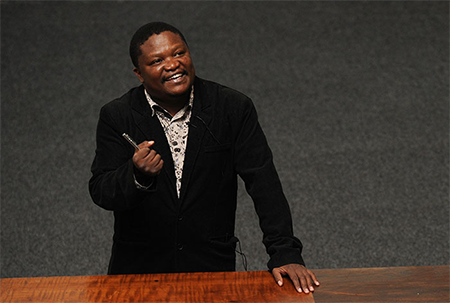African people have been observing the stars and planets since ancient times and modern-day science is now paying close attention to the wealth of knowledge within traditional African astronomy.
Prof Thebe Medupe, an academic at the North-West University’s (NWU’s) campus in Mahikeng, uses his research to shed light on the ancient science of African astronomy, and in turn enhance global understanding of the world’s oldest science.
He also looks at celestial beliefs – beliefs about the skies and outer space – from different parts of the African continent, and at how some of these ancient African perspectives link with current scientific knowledge.
Prof Medupe says he has always been keen to travel through Africa and explore the celestial beliefs from different parts of the continent, gathering knowledge for a database of traditional African astronomy, to be used for science education.
Film tells a story
He used a film, Cosmic Africa, to explore Africa's ancient astronomical history and tell the story of cultural astronomy and historical scientific activity in Africa.
His film-making experience includes serving as an associate producer of the documentary titled The Ancient Astronomers of Timbuktu, where he guided a group of modern scientists engaged in the first exploration of the scientific contents of the great manuscript archives of Timbuktu.
As the ancient papers are in grave danger of being destroyed by the ravages of time, the team is racing against the clock to unlock the mysteries of this incredible library before this valuable history is lost forever in the sands of the Sahara.
Making his own telescope
Prof Medupe grew up in a poor village outside Mmabatho and was inspired by Halley's Comet to build a crude telescope with a cardboard tube and lenses donated by a school lab technician.
On an unforgettable chilly, windy night, he pointed his telescope at the moon and found himself looking at the mountains, plains and craters of another world. "I was 13 years old the first time I looked at the moon and I was hooked. That's when I knew for sure that I was going to become an astronomer," says Prof Medupe.
From that point, his involvement in maths and science grew and he began to read more widely.
It was his mother’s unshakeable belief in him that inspired him to aspire to great heights, he says.
Aiming high
In 1990, at the age of 17, he won a Science Olympiad and was awarded a trip to England to visit its science institutions. That was the first time he had been outside Africa. "I made sure I went to the Greenwich observatory where I saw a working telescope for the very first time. It increased my motivation to become a scientist," he says.
On completing school, he won a scholarship to study at the University of Cape Town. There he completed a first degree in physics, as well as a master’s and doctorate in astrophysics.
Back to his roots
After leaving university, Prof Medupe's first role was as a research fellow at the University of Cape Town. However, he asked the director of the observatory to allow him to return to his home town to try to get some of the youth into astronomy. "Part of my reason for wanting to do that was my annoyance at people telling me that black South Africans were not interested in astronomy." Within the first year, nine young hopefuls were involved in research projects that he was conducting.
He is now the head of the NWU’s Mahikeng Astronomical Observatory in Dinaleding, which runs outreach programmes on astronomy for schools in the North West province and conducts “bright star astronomy” research.
“The main thing about the stars is that they are variable; their light output changes with time because of the seismic waves or sound waves that exist in the stars,” says Prof Medupe, whose area of research is aster seismology. “The stars I specialise in have strong magnetic fields,” he explains. “We use the sounds waves generated inside these stars to try and learn about the makeup of the stars.”
While humanity has only discovered a fraction of the life and characteristics of stars, rest assured that Prof Medupe, backed by modern science and age-old African astronomy, has set his sights on putting African knowledge at the forefront of discovery.
Prof Thebe Medupe
